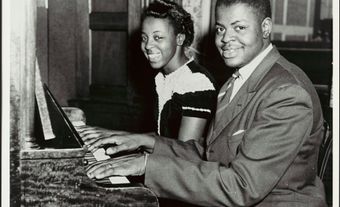Berthe Roy
Berthe Roy. Pianist, teacher, b Quebec City 8 Feb 1889, d there 9 Nov 1951; honorary D MUS (Laval) 1943. At three she showed surprising talents, including an exceptional memory. After studying piano with her father, Philéas, she made her debut at eight at the Château Frontenac hotel. In New York, among over 500 contestants, she was chosen to receive a scholarship from the National Conservatory of Music, where she studied with Rafael Joseffy. She worked also with Gaston Dethier (piano) and Romualdo Sapio (singing). During a three-year stay in Paris she took courses at the Conservatoire with Antoine-Émile Marmontel (piano) and Anna Arnaud (singing). She could play from memory all of the fugues of Bach's Well-tempered Clavier and transpose them into all keys. She allegedly accomplished this feat in the presence of guests of the organist-composer Alexandre Guilmant at his house in Meudon. Guilmant is said by Madeleine Gleason-Huguenin to have then declared: 'I do not believe there is anyone present who could do as much.'
Numerous concerts in the USA and Europe earned Roy the highest praise, in particular during a North American tour 1907-8 with the violinist Jan Kubelík. The tour included a concert 25 Mar 1908 at Massey Hall in Toronto. She settled in 1914 in Quebec City, where she gave private lessons and taught at Laval University. Several of her pupils won the Prix d'Europe: Lucille Dompierre (1919), Anna-Marie Messénie (1922), Conrad Bernier (1923), and Henri Mercure (1927). Her booklet Amateur et artiste was published in Montreal in 1944. She died in poverty after being paralyzed for 10 years.
See also Léo Roy (her brother).

 Share on Facebook
Share on Facebook Share on X
Share on X Share by Email
Share by Email Share on Google Classroom
Share on Google Classroom

